The Second World War has not ended yet, when the specter of a new conflict looms over Europe. On July 1, 1945, nearly 4 million Allied soldiers were to attack Poland and free it from Soviet occupation. Apart from the Red Army, the Polish People's Army would also stand in their way.
The plan for this operation, called "Unthinkable", was initiated by Winston Churchill. The British Prime Minister was very concerned that the Soviet army controlled most of Europe. He saw it as a threat not only to Great Britain, but also to the rest of the continent. Quoted in Jonathan Walker's book, World War Three. The secret plan to free Poland from Stalin's hands ", in a letter to President Truman, he wrote: The Russians can take over the areas all the way to the North Sea and the Atlantic with one short offensive, if they wish.
Miś Wojtek, grandfather from Wehrmacht and other friends
Units of the Polish Armed Forces in the West, commanded by General Władysław Anders, were to take part in the planned offensive. This army, numbering 194,000 at the end of the war. soldiers and one bear , had a large shock potential.
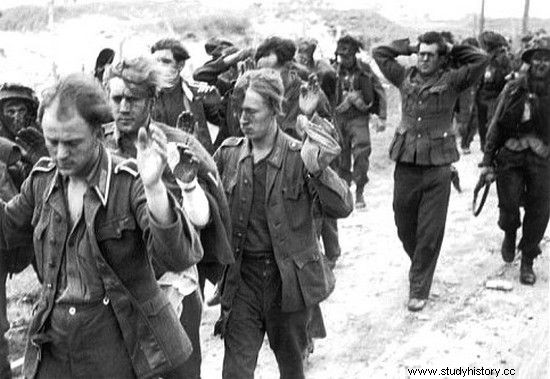
The influx of new soldiers for the Polish Armed Forces in the West in 1944 was guaranteed by Poles forcibly conscripted into the Wehrmacht.
The Allies of sheepdogs, seeing that the PES continued to increase in numbers, despite the lack of recruitment opportunities. It was caused by a massive influx of Poles (about 100,000 people) who had been forced into the Wehrmacht. A good example is Józef Tusk, the famous "grandfather from the Wehrmacht" the current prime minister. In 1944, he was incorporated into a German auxiliary unit and sent to the eastern front. Then, evacuated with a detachment from Courland, he ended up in Denmark. He finally surrendered to the Allies near Aachen and ended the war in a PES uniform .
The morale of the Polish army was very high, and the soldiers were ready to go to the rescue of occupied Poland, no matter who turned out to be the occupier. For example, in August 1944, soldiers from the 1st Independent Parachute Brigade revolted and went on a hunger strike in protest against the Allied decision to refuse to send the Brigade to Warsaw in the uprising .
British field marshal Alan Brooke, in turn, recalled the meeting with General Anders in May 1945, when there were no more illusions about the real shape of post-war Poland:
This afternoon Anders (...) came to see me again. He says there are at least a million Poles in Western Europe whom he can (and intends) enlist in his ranks. He wants to take part in the occupation of Germany, also imagined himself to break through the Russians into the country! We will have quite a bit of a clash with the Polish army (quoted in "World War III").
In an interview with General Patton, Anders stated that if his corps were between the German army and the Soviet army, he would have trouble, because he would not know which enemy to fight .
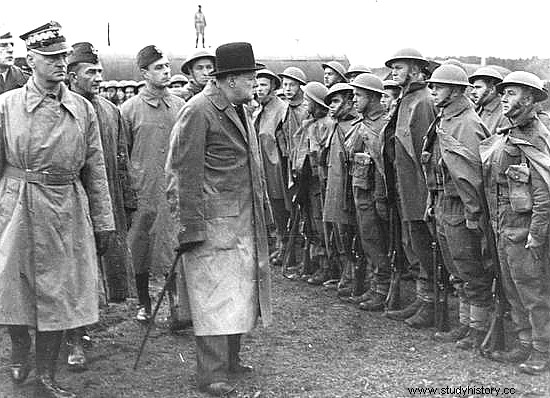
Winston Churchill visits Polish troops stationed in England (1943). Two years later, the British Prime Minister was very confident that the Poles would help him in the planned war with the Soviet Union.
British planners also very much counted on the reactivation of nearly 220 thousand. soldiers and supporters of the Polish armed underground . They were to operate behind the Soviet army and its Polish communist ally.
Black devils Maczek vs. four tankmen and a dog
One of the variants of the "Unthinkable" plan was to fight a great tank battle with the Soviets on Polish territory. It was very likely that Gen. Maczek's Shermans would clash with the T-34 with the Piast eagle on the armor.
If, however, such a confrontation had occurred, which side would have been victorious? Would Poles standing on the opposite sides of the front, as has happened many times in our history, start murdering each other? Let us consider to what extent the Polish People's Army was really "Polish" and was it loyal to its ally?
Commander with sentence
The LWP was to be the pillar of the future communist system in Poland. It was from his ranks that later party and military dignitaries as well as security officials such as Edward Ochab, Józef Light, Piotr Jaroszewicz and Wojciech Jaruzelski came.
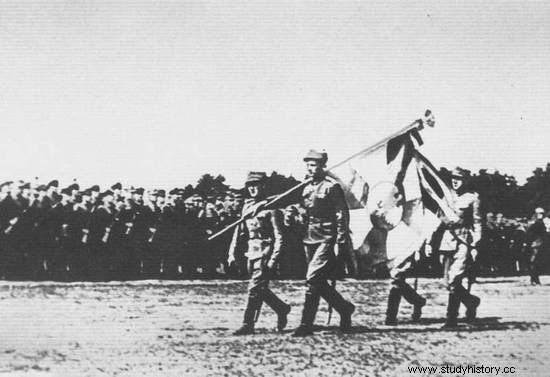
The first Polish unit formed in the USSR under the auspices of the Union of Polish Patriots was the Infantry Division. Tadeusz Kościuszko.
The first unit, formed in May 1943, was the 1st Infantry Division. Tadeusz Kościuszko. The commander, on the orders of Stalin, was appointed Lt. Zygmunt Berling, a former officer of the Polish Legions, an NKVD agent, sentenced by default of a field court for treason to the death penalty . The ranks of the division included mainly Poles who, due to various circumstances, failed to reach Anders' army.
The unit passed its baptism of fire at the Battle of Lenino. Exhausted by slave labor in Soviet labor camps, after only six months of training, due to errors of the command and lack of artillery support, Polish soldiers suffered heavy losses.
In the official propaganda of the Polish People's Republic, the battle was a symbol of the Polish-Soviet brotherhood in arms, it was a secret that a group of Polish soldiers joined the Germans at that time, warning them of the planned attack .
A naked general who did not bow to bullets
The expanding PFL struggled with a permanent shortage of senior officers and specialists in the technical services, which is why, on Stalin's order, they were delegated from the ranks of the Red Army "to the position of a Pole". In 1945, they accounted for almost half of nearly 40,000. officers of the Polish Army. There were also graduates of the famous School of Red Communards, incl. Gen. Stanisław Popławski and Gen. Karol Świerczewski-Walter, who were respectively the commanders of the 1st and 2nd Polish Army.
Especially the latter, nota bene a collaborator of the Soviet military intelligence, wrote a shameful page in the history of the people's army. A compulsive alcoholic who happened to be in the "indicating state" in only panties and for this reason he often "did not bow to crutches".
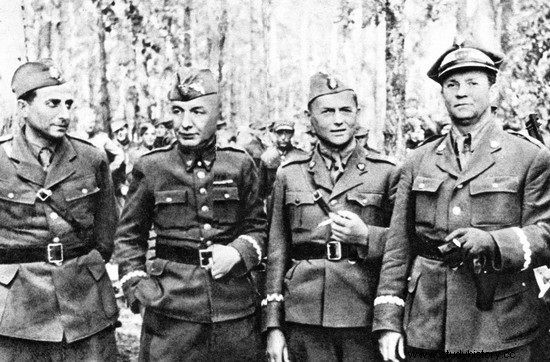
Karol Świerczewski (second from the left). A drunkard and a poor commander, but a friend of Hemingway's.
Świerczewski became famous already during the civil war in Spain as a friend of Hemingway, who also did not pour over his collar. Then, in 1941, he commanded the 249th Infantry Division, which was smashed in the cauldron near Wiaźma, and ... 5 people and the commander were saved from the entire division.
His miserable commanding talents made themselves felt in the Battle of Bautzen, which was lost by the Poles, where, as one of the officers of the 2nd AWP put it: Świerczewski probably commanded in a drunken sight . The result of the battle is over 18,000. killed, wounded and missing, although some sources even mention losses of 25,000.
The staff shortages were to be supplemented by a network of officer schools that were being established in the liberated territories of Poland. It was enough for a candidate for a future officer to have completed 7 years of primary school, but he had to be a worker, peasant or come from the so-called working intelligence. There were times when the studies lasted only a few weeks.
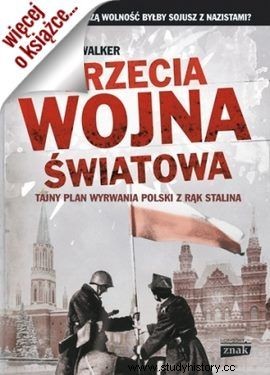
Busts, desertions and distrust
The wave of rebellions and desertions was also a serious problem for the Polish People's Army. In 1943-48, over 24,000 deserted from the ranks of the communist army . soldiers and officers, half of them in 1945 They were often whole units.
On the night of October 13-14, 1944, the entire 31st Infantry Regiment fled from the 2nd Polish Army. On March 3, 1945, 300 soldiers escaped from the officer school in Chełm. On March 4, the entire backup battalion from the 9th Infantry Division deserted, and on the night of May 3-4, a battalion from the backup 6th Infantry Regiment revolted, and its soldiers, together with the commander, joined the 5th Vilnius Brigade of the Home Army commanded by Major Zygmunt Szendzielarz, the famous " Lupaszka ”.
When in August 1944 the PKWN announced mobilization in the liberated territories of Poland, it was met with a general boycott. For example - as Walker writes - in one recruitment out of 700 conscripts only 100 favored the cause of communism! According to general estimates, in the 1st Army of the Polish Army, Soviet comrades could count on the loyalty of 60% of Polish soldiers, and in the 2nd Army it was only 40%.

Despite communist propaganda, in the initial period of its existence, the Polish People's Army had huge problems with desertion. There were times when whole squads deserted.
Such was the Polish People's Army:commanded by drunken Soviet generals with no soldiers' blood, staffed with hastily trained, ignorant officers, laden with Soviet agents. Would it be a counterweight to well-motivated and trained soldiers of the Polish Armed Forces?
"Unthinkable" - It could have worked!
If the Polish units clashed with each other, it would most likely result in rebellions and mass desertions of the Polish People's Army soldiers. Perhaps the Soviet cadre would have put up some resistance, but it is almost certain that the disorganized Polish People's Army would no longer count as a real combat force.
Would Operation Unthinkable bring Poland liberation and would our country avoid the scenario written by Stalin? And if the West began to fail, would a nuclear Armageddon be involved in any of the Eastern European cities? One thing is certain:Poland would become the arena of another terrible struggle, which would probably completely devastate its territory and result in further victims.
Nevertheless, it is a bit of a regret that we are not given the chance to watch the newsreels showing General Anders riding a white stallion and leading the parade of the victorious Polish troops in the destroyed but free Warsaw . The legend would become a fact. Europe, however, was tired of the war. There were no enthusiasts to unleash another one.
